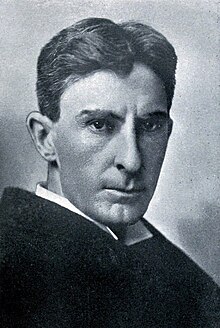Thomas Dixon, Jr.
| Thomas Dixon Jr. | |
|---|---|
 |
|
| Born | Thomas Frederick Dixon Jr. January 11, 1864 Shelby, North Carolina, United States of America |
| Died | April 3, 1946 (aged 82) Raleigh, North Carolina, United States |
| Occupation | Novelist, playwright, minister, state legislator, lecturer |
| Nationality | American |
| Genre | Historical fiction |
| Literary movement | American Romanticism |
Thomas Frederick Dixon Jr. (January 11, 1864 – April 3, 1946) was a Southern Baptist minister, playwright, lecturer, North Carolina state legislator, lawyer, and author. In popular literature, two early 20th-century novels by Dixon—The Clansman (1905) and The Leopard's Spots: A Romance of the White Man's Burden – 1865–1900 (1902)— romanticized white resistance to Northern/black coercion, hailing vigilante action by the KKK. Film director D. W. Griffith gained fame for his adaptation of The Clansman for the screen in The Birth of a Nation (1915); the film stimulated the formation of the 20th-century version of the KKK.
Dixon was born in Shelby, North Carolina, the son of Thomas Jeremiah Frederick Dixon and Amanda Elvira McAfee.
His father was a wealthy landowner of English and Scottish descent, and Baptist minister. As a young man, Dixon Sr. inherited a large number of slaves and property from his first wife's father. Thomas J. F. Dixon I, while not an abolitionist, did not want to own slaves himself. At one point he was offered US $100,000 (today roughly $5,000,000) for his slaves, but he declined the offer, worried that their new owner might mistreat them.
In his adolescence Dixon helped out on the family farms, an experience that he hated, but that he later would say helped him to relate to the plight of the working man. Dixon grew up during Reconstruction following the Civil War. The government confiscation of farm land, the corruption of local politicians, and particularly the vengefulness of Federal troops coupled with the general lawlessness of the time all helped to shape young Dixon into a staunch opponent of what he called one of history's greatest tragedies.
Dixon claimed that one of his earliest memories was of a woman who pleaded for his family's help. She was the widow of a Confederate soldier who served under Dixon's uncle, Col. Leroy McAfee. She claimed that a black man had raped her daughter. That night the Ku Klux Klan hanged and repeatedly shot the alleged rapist in the town square. Dixon's mother commented to him that "The Klan are our people—they're guarding us from harm." It was a moment that etched itself into Dixon's memory; he felt that the Klan's actions were justified, and that desperate times called for desperate measures.
...
Wikipedia
